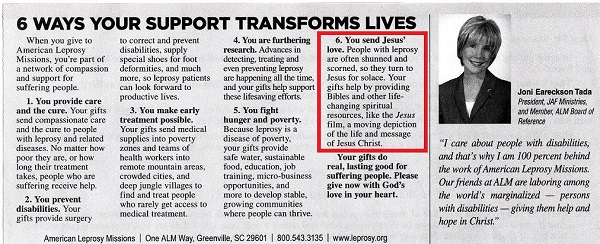The newest charity that’s sent me an explicitly religious solicitation is American Leprosy Missions, “the oldest and largest Christian organization in the United States dedicated to curing and caring for people affected by leprosy and related diseases around the world”. Take a look:
Imagine pulling a dollar bill out of your pocket and seeing it multiply 33 times, like Jesus multiplying the loaves and the fishes!
That’s what you can do today. Because now every $1 you give will turn into $33 of good for people suffering with leprosy and the related disease, Buruli ulcer. It’s a miracle! Praise God!
…How’s this possible? Your gift will cover the cost to ship medical supplies that were donated to us for free. So, every $1 you give sends $33 of medical supplies for people who are suffering. Please give now. Send Jesus’ love.
That’s not what “miracle” means, guys. If you read the Bible, you’ll see that a miracle is an inexplicable violation of the laws of nature, performed by God’s chosen as a demonstration of his supremacy over nature. If you could, say, touch a leprosy sufferer and heal them on the spot, that would be a miracle. This is just cost-efficient freight rates on international shipping.
With language like this, you have to assume that this letter is aimed at the easily impressed. The target audience must be Christians who would get a warm fuzzy glow from the thought that they’re facilitating a “miracle”, even though all they’re doing is paying to deliver medical equipment developed through science and administered by human beings. That’s the furthest thing from a miracle you get.
You have to wonder, do the employees of this charity have any fear that they’re contravening God’s will by helping to treat leprosy sufferers? Because on several occasions in the Bible, God causes leprosy as a means of demonstrating his displeasure. Here’s one example: when Miriam and Aaron, Moses’ brother and sister, criticize him for marrying an outsider, God strikes Miriam (yes, just Miriam) with leprosy:
“And the anger of the Lord was kindled against them; and he departed. And the cloud departed from off the tabernacle; and, behold, Miriam became leprous, white as snow: and Aaron looked upon Miriam, and, behold, she was leprous. And Aaron said unto Moses, Alas, my lord, I beseech thee, lay not the sin upon us, wherein we have done foolishly, and wherein we have sinned.”
—Numbers 12:9-11
In another story, the prophet Elisha curses his unfaithful servant Gehazi with leprosy, saying that it will “cleave unto thee, and unto thy seed for ever” (2 Kings 5:27). God also strikes the Israelite king Uzziah with leprosy when he tries to burn incense in the temple, instead of the priests who are supposed to do it (2 Chronicles 26:19).
If you believe all these stories are historically true, I would think you’d want to tread very carefully, given God’s seeming affection for leprosy as a means of punishment. How can American Leprosy Missions be sure that they’re not treating someone whom God has afflicted with leprosy to punish? Isn’t it possible that at least some of those sufferers are sinners getting what they deserve, and anyone who helps them will fall under a divine curse themselves? Obviously, an atheist doctor wouldn’t give that any credence, but it’s hard to see how Christians can dismiss it so lightly.
There’s a flip side to this letter that I also wanted to point out. On the back side, it boasts about how their gifts “do real, lasting good for suffering people”. But in addition to medical treatment and other basic needs, at least some of the donations given to this charity go to proselytizing:
People with leprosy are often shunned and scorned, so they turn to Jesus for solace. Your gifts help by providing Bibles and other life-changing spiritual resources, like the Jesus film, a moving depiction of the life and message of Jesus Christ.
This is the reason I don’t give to religious charities. You never know how much of your donation will go towards actual, meaningful help, and how much will be used to push religious messages on a captive audience of marginalized and vulnerable people. This is especially true when you consider that much of the stigma they mention comes from Judeo-Christian beliefs that have historically treated leprosy as an unclean disease and leprosy sufferers as sinners. By spreading those beliefs and the book that promotes them, it’s possible that this charity will further disseminate those prejudices in a way that counterbalances whatever good they’re able to do.

